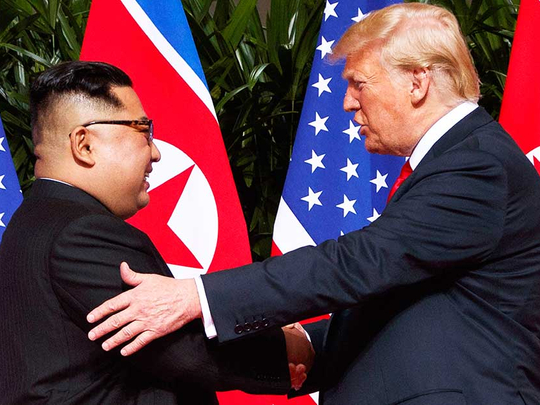
There is nothing like going to a very different part of the world to get a fresh perspective on an intractable policy problem. In recent months, both of us have been focused on United States President Donald Trump’s nuclear diplomacy with North Korean leader Kim Jong-un. Will he succeed in his bold gambit of offering economic and security benefits in return for lasting peace with North Korea?
The US has tried something similar with the Palestinians — and keeps on trying, with the White House working on the latest “peace plan”. The Oslo peace process, which began in 1993, offered Palestinians a deal: In return for recognising Israel and ending the armed struggle, they would get a state of their own. To sweeten the deal, the US and its allies showered the Palestinian National Authority (PNA) with assistance. We saw some of the fruit of that aid — along with remittances from Palestinians abroad — when we visited Ramallah, in the West Bank, as part of a trip organised by a non-partisan group called Academic Exchange. The Palestinians’ de facto capital is full of gleaming new buildings. Per capita gross domestic product among Palestinians has more than doubled — from $1,200 (Dh4,414) in 1994 to $2,900 today.
Economic aid has helped to grease the skids for security cooperation between the PNA and Israel, but it hasn’t brought peace any nearer. No Palestinian leader has been willing to sign a “final status” accord that would resolve contentious issues such as the status of occupied Jerusalem or Palestinians’ claims to a “right of return”. Palestinian leaders have never known a day when they were not struggling against the Jewish state, even if only rhetorically. Israel, under a right-wing government, isn’t ready to sacrifice. It has its own victimhood narrative, doesn’t trust the Palestinians and is in thrall to the settlers’ lobby.
North Korea is another relatively new polity whose identity was forged in opposition to external enemies. Since 1948, the Kim family has claimed the right to rule as the defenders of the Korean proletariat against the American “feudalists” and “imperialists” and their “lackeys” in Seoul.
Trump promises to make North Korea “very rich” if it gives up its nuclear weapons and missiles. There has been talk of a peace treaty and extension of US diplomatic recognition to Pyongyang. But if Kim takes this “historic deal”, he would not only have to give up the weapons that ensure his own survival. He would also have to give up the ideological raison d’etre for his regime — the rationale that justified decades of suffering by the North Korean people.
Ruthless autocrat
There have been visionary leaders, such as Mustafa Kemal Ataturk, Deng Xiaoping and Mikhail Gorbachev, who have wrought such dramatic transformations. But Gorbachev serves as a cautionary example for Kim: By attempting to liberalise the Soviet Union, he destroyed the state — and his own hold on power.
We know that Kim is a tough, ruthless autocrat who is willing to kill his own relatives. Could he be a transformational leader, too? It’s true that, having been educated in Switzerland, he knows how much better life is in the West. No doubt he would like his kingdom to become more prosperous. To achieve a relaxation in sanctions and enhance his own legitimacy, he is happy to hobnob with world leaders, including Trump. But no one should consider him serious about denuclearisation unless he first provides a complete declaration of his nuclear programme — much of it covert. So far he hasn’t done that. Instead, he’s actually improving his nuclear research facility.
Thus, we have not seen any evidence that Kim will prove any bolder or more courageous than the Palestinian leaders in seeking peace. Unelected autocrats cannot easily afford to dissolve the ideological glue holding their ramshackle regimes together no matter how many riches we dangle before their eyes. When it comes to both the Palestinians and North Korea, the best the US may realistically hope for is to manage the conflict, and with Kim perhaps agreeing to scale back his nuclear arsenal. The “deal of the century” that Trump seeks to “solve” each of these problems is likely to remain out of reach.
— Washington Post
Max Boot, a columnist, is the Jeane J. Kirkpatrick senior fellow for National Security Studies at the Council on Foreign Relations and a CNN analyst. Sue Mi Terry is senior fellow for Korea at the Center for Strategic and International Studies and an MSNBC contributor.








